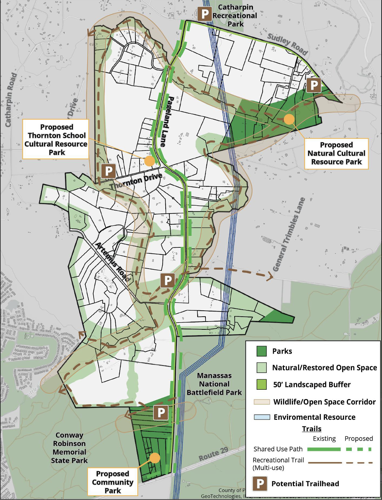
A new amendment to Prince William County’s highly controversial PW Digital Gateway plan may pose a significant threat to the Occoquan Watershed, which is the primary source for Fairfax Water’s Occoquan Reservoir. Occoquan Reservoir is a major source of fresh water to multiple settlements in the Northeast Virginia area, serving 1.2 million residents of Fairfax County, the City of Alexandria, and Prince William County.
On November 2nd, 2023, the Comprehensive Plan Amendment #CPA2021-00004 changes were approved by the Gainesville Magisterial District, 5-2 after a 14-hour public hearing and discussion that lasted from Nov 1st to 10 am the following day. This ruling rezoned the land allotted to the Digital Gateway from “Agricultural” to “Technology / Flex with a T-3 Transect, POS, Parks and Open Space, CRHS, County Registered Historic Site, and an Environmental Resource Overlay.” This data center build is estimated to allow Prince William County to rival or even surpass Loudon’s international digital notoriety. In February, the Deputy Finance manager for Prince William County published projections estimating that the yearly tax revenue from this data center could easily be $400 million within 20 years, compared to the current $80 million and Loudoun County’s $576 million.
The Occoquan Watershed is a basin that spans 570^2 miles and contains three primary impoundments: Lake Jackson, Lake Manassas, and the Occoquan Reservoir. Occoquan Reservoir is the primary water source for 2 million people, about half of whom are residents of Fairfax and Prince William Counties, according to An Analysis of the Occoquan Watershed Reservoir(VA Tech).
Kyle W Hart, field representative of Mid Atlantic National Parks Conservation Association, wrote in 2022 that a fully built data center to the plan’s specifications in those locations would drop sediment that would “be expected to be up to 57,000 tons, the equivalent of approximately 4,000 large dump trucks of sediment being dumped into the Occoquan Watershed. The additional sediment would lead to decreased water quality in Bull Run and the Occoquan Reservoir, negative impacts to the recreational angling the lake offers, and decreased storage capacity of the Occoquan Reservoir. Additional impervious surfaces created by this development would cause an additional 280 million gallons of additional stormwater runoff into the Occoquan Watershed annually, thus increasing the risk of flash flooding downstream and decreasing groundwater and aquifer recharge.”
A motion to establish the Occoquan Watershed as a critical and protected natural resource was raised at the regular meeting of the Fairfax Board of Supervisors on November 1st, and presented by Fairfax Supervisor Pat Herrity(R-Springfield) in conjunction with Chairman Jeff McKay (D), Supervisor Kathy Smith (D-Sully), and Supervisor Dan Storck (D-Mount Vernon). Herrity confirmed on behalf of the board: “The Fairfax County Board of Supervisors, on behalf of all citizens of Fairfax County, reaffirm its commitment to the continued efforts by the county, related agencies, and residents to protect and preserve this critical natural resource for future generations just as the previous Board did in 2016.” The board supported the motion unanimously.
Additionally, a memo was coordinated between the Fairfax County Departments of Transportation, Public Works and Environmental Services, and Planning and Development to Rebecca Horner, deputy county executive of Prince William Planning Office. It read: ”The proposal to expand public sewer and water to serve the proposed data centers would not be compatible with the critical need to protect the Occoquan Reservoir … We have an overarching concern about the proposal to permit higher density development within the larger Occoquan Watershed due to cumulative impacts on the Reservoir, which provides drinking water to a large portion of Northern Virginia.” These efforts appeared to have no effect on the decision of the Prince William County Board Supervisors.



















